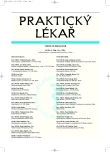-
Medical journals
- Career
Our experience with the treatment of acute mesenterial ischemia
Authors: J. Vokurka; J. Žák; M. Kábela; M. Veselý; J. Čierník
Authors‘ workplace: Přednosta: Prof. MUDr. Ivan Čapov, CSc. ; I. chirurgická klinika LF MU, Nemocnice u sv. Anny Brno
Published in: Prakt. Lék. 2007; 87(1): 43-45
Category: Of different specialties
Overview
Acute mesenterial ischemia (AMI) is a serious illness with a low incidence, but with a very high mortality (60 to 70 %). The aetiology of AMI is either primary (embolism, mesenterial vessel thrombosis, nonocclusive mesenterial ischemia) or secondary (mechanical obstruction – gut volvulus, intussusceptions, compression by a tumour, etc.). Whatever the origin of the illness, the pathological-clinical picture is always the same: intestinal ischemia with resulting necrosis. 43 patients with primary AMI have been treated at the First Surgical Department in Brno between 1994 and 2006. Patients with atrial fibrillation or myocardial infarction had a significantly higher prevalence of arterial mesenterial ischemia (p < 0, 05). Arterial mesenterial thrombosis was significantly higher in patients who smoked and who showed symptoms of hypertension and of abdominal angina (p < 0,05).
Key words:
acute mesenterial ischemia, surgery, treatment
Labels
General practitioner for children and adolescents General practitioner for adults
Article was published inGeneral Practitioner

2007 Issue 1-
All articles in this issue
- Patent foramen ovale as a cause of paradoxical embolization in scuba divers. Screening possibilities, therapeutic and preventive recommendation.
- Hypoglycaemia-associated autonomic failure, its clinical assessment and treatment.
- Chronic renal failure in primary care
- Prescription of psychotropic drugs during pregnancy and breast-feeding in the general practitioner’s surgery.
- Wilson’s disease
- Diagnostics and treatment of rheumatoid arthritis – some new aspects
- Biochemical molecular mechanisms of heart failure (Part 2)
- Antimicrobial resistance in seven invasive bacterial species* monitored within EARSS in the Czech Republic (CR) from 2000 – 2006. (*Streptococcus pneumoniae, Staphylococcus aureus, Enterococcus faecalis, Enterococcus faecium, Escherichia coli, Klebsiella pneumoniae, Pseudomonas aeruginosa).
- Childhood injuries and their prevention
- Our experience with the treatment of acute mesenterial ischemia
- Craniopharyngioma in 79 years old man – a case study
- General Practitioner
- Journal archive
- Current issue
- Online only
- About the journal
Most read in this issue- Chronic renal failure in primary care
- Craniopharyngioma in 79 years old man – a case study
- Wilson’s disease
- Hypoglycaemia-associated autonomic failure, its clinical assessment and treatment.
Login#ADS_BOTTOM_SCRIPTS#Forgotten passwordEnter the email address that you registered with. We will send you instructions on how to set a new password.
- Career

